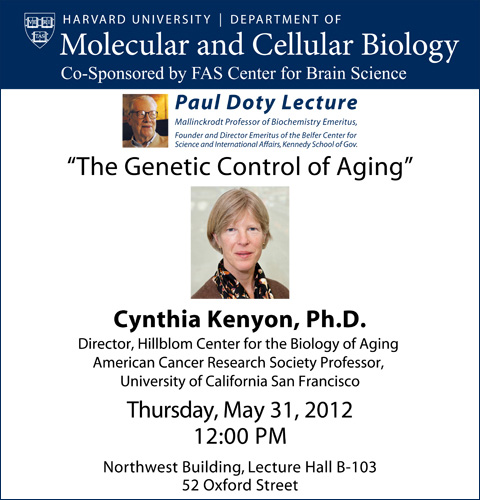Cynthia Kenyon, American Cancer Society Research Professor and director of the Hillblom Center for the Biology of Aging, at UCSF, is the 2012 Paul Doty lecturer. Cynthia will present a lecture titled “The Genetic Control of Aging” at noon on Thursday May 31st.
Cynthia Kenyon was raised in Georgia and graduated Valedictorian from the University of Georgia. She then attended MIT for her graduate studies, where she worked with Graham Walker studying DNA damage induced gene expression in E. coli. Her postdoctoral research was performed at the MRC in Cambridge with Sydney Brenner, where she initiated studies on the genetic control of anterior-posterior pattern formation in the nematode Ceanorhabditis elegans. In 1986 she joined the faculty in the Department of Biochemistry and Biophysics at UCSF, where she continued her work on developmental patterning showing that the C. elegans homologs of the Drosophila HOX genes pattern the nematodes anterior-posterior body axis, demonstrating that the HOX genes were not simply segmentation genes, but ancient metazoan patterning genes.
In the early 1990’s Cynthia became interested in the seemingly intractable problem of aging. At the time aging was not considered to be a regulated process, but simply what happened as organisms accumulated cellular damage. Pursuing the hypothesis that genes rather than thermodynamics (entropy) control aging, Cynthia performed genetic screens for mutants with extended and/or shortened lifespan. Her findings not only identified the central role of hormone signaling pathways in lifespan control, but have contributed significantly to the establishment of the field of the molecular biology of aging (see http://kenyonlab.ucsf.edu/html/history.html for a personal account of the discovery of long-lived mutants).
Cynthia has been the recipient of many honors, including the Dan David Prize, King Faisal Prize for Medicine, and the AARP Inspire Award. Cynthia is also a member of the National Academy of Sciences, the American Academy of Arts and Sciences, and the Institute of Medicine.
On a personal note, Cynthia has adopted a diet in line with her findings – what is good for worms (and flies and mice) is good for the professor. She eats a low carbohydrate diet designed to minimize insulin secretion. This diet may or may not extend her lifespan, but she looks and feels great.
[May 29, 2012]


